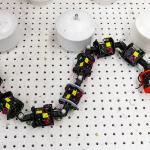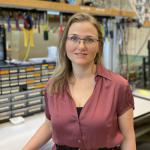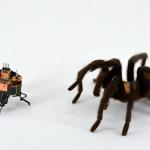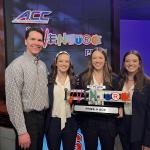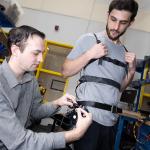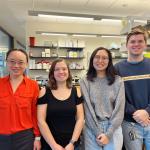Worms and snakes seem to wiggle their way across varying environments without needing to learn the terrain. In more complex landscapes, they move even faster, using obstacles to propel themselves…
News
Faculty from the George W. Woodruff School of Mechanical Engineering, including Associate Professors Gregory Sawicki and …
Biomedical engineer Annabelle Singer has spent the past decade developing a noninvasive therapy for Alzheimer’s disease that uses flickering…
Two children are playing with a set of toys, each playing alone. That kind of play involves a somewhat limited set of interactions between the child and the toy. But what happens when the two…
The University System of Georgia Board of Regents has approved a new Neuroscience and Neurotechnology Ph.D. Program at Georgia Tech.
The interdisciplinary…
Robots that can run, jump, and even talk have shifted from the stuff of science fiction to reality in the past few decades. Yet even in robots specialized for specific movements like running,…
For the past 10 years, the National Institutes of Health have led an unprecedented effort to revolutionize our understanding of the human brain. The aptly named…
Aaron Levine, associate dean for research and outreach in the Ivan Allen College of Liberal Arts, has been named a fellow of the American Association for the Advancement of Science (AAAS), the…
From completing puzzles and playing music, to reading and exercising, growing up Dolly Seeburger loved activities that demanded her full attention. “It was in those times that I…
As the April 8 solar eclipse approaches, millions of people anticipate participating in the wonder of this celestial event. Yet, for those with visual impairments, traditional methods of observing…
Three Georgia Tech students who created a pediatric medical device won $15,000 Wednesday night during the 2024 ACC InVenture Prize, an annual…
Georgia Tech opened the 11th annual Atlanta Science Festival (ASF) with record attendance for…
Robotic exoskeletons designed to help humans with walking or physically demanding work have been the stuff of sci-fi lore for decades. Remember Ellen Ripley…
The skin on our hands and feet collectively makes up roughly 5% of our surface area — at least, when it comes to our bodies. When you look at an important sensory area of the brain called the…
This press release is shared jointly with the UC Irvine newsroom…
